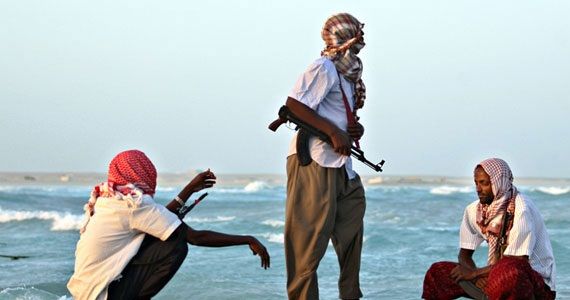
While the consensus seems to be that Somali piracy is in a terminal decline, over the weekend the Washington Post’s Wonkblog highlighted an interesting academic study from last year that attempted to determine the costs of Somali piracy since 2008. The bottom line, from economists Timothy Besley, Thiemo Fetzer and Hannes Mueller, was that piracy increased the cost for shipping bulk cargo through the region 8%, with a 14% seasonal discount between December-February and June-September when the monsoon causes sea states to be less hospitable to pirates.
Of particular interest is the economist’s attempt to measure how efficient piracy has been as a method of transferring wealth from the rest of the world to Somalia. According to their analysis, pirates generating a total in $120M in annual ransoms would possibly drive industry to spend up to ten times that amount on insurance and onboard security. Theoretically, Somalia could get the same amount of money from an .8% tax on charters than the 8% increased costs faced by shippers.
Piracy has driven some economic growth in Somalia, with one study arguing that ransoms received in 2009 were five times greater than the budget of Puntland. Such development has been uneven however and did not benefit all Somalis. Intriguingly, economic growth and development measured in terms such as construction, urbanization, and light emissions measured through overhead imagery showed significant growth in major Puntland cities like Bossasso, rather than main Puntland pirate bases like Eyl and Hobyo.
Although ransoms as a wealth transfer are a “thought experiment” which the authors don’t necessarily advocate as policy, there is a clear subtext that aid for effective security forces would be a cheaper method to achieve the security needed to eliminate piracy than paying ransoms or funding afloat counter-piracy task forces. They cite Stig Hansen’s compelling argument that the triggering event for the explosion of piracy in recent years was the Puntland economic crisis in 2008, during which the government of the semi-autonomous region suspended pay to the police and militia responsible for border security.
Of course while a tax on trade to fund a wealth transfer to Somalia may have been a much more efficient way of combating piracy than the current combined approach of naval forces afloat, industry best practices, a Kenyan invasion of Somalia, and the funding of AMISOM troops (in a previous article in Proceedings I vainly attempted to compare the relative costs and benefits of counter-piracy task forces afloat and security forces in Somalia), it does not square with any accepted notion of freedom of navigation in international waters. While an effective Somali government would certainly have the right to regulate economic activity in its Exclusive Economic Zone (commonly listed narratives for the start of piracy in the region include grassroots local efforts to regulate illegal fishing and toxic waste disposal by foreigners in Somali waters), impeding or taxing commercial shipping traversing international waters adjacent to Somalia would be unacceptable to the international community.
Lieutenant Commander Mark Munson is a Naval Intelligence officer currently serving on the OPNAV staff. He has previously served at Naval Special Warfare Group FOUR, the Office of Naval Intelligence, and onboard USS Essex (LHD 2). The views expressed are solely those of the author and do not reflect the official viewpoints or policies of the Department of Defense or the US Government.

One thought on “Economics and Somali Piracy”